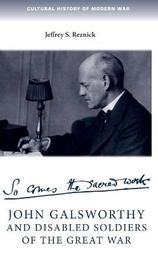
|
John Galsworthy and Disabled Soldiers of the Great War: With an Illustrated Selection of His Writings
Hardback
Main Details
| Title |
John Galsworthy and Disabled Soldiers of the Great War: With an Illustrated Selection of His Writings
|
| Authors and Contributors |
By (author) Jeffrey Reznick
|
| Series | Cultural History of Modern War |
|---|
| Physical Properties |
| Format:Hardback | | Pages:240 | | Dimensions(mm): Height 216,Width 138 |
|
| Category/Genre | British and Irish History
First world war |
|---|
| ISBN/Barcode |
9780719077920
|
| Classifications | Dewey:940.477 |
|---|
| Audience | | Tertiary Education (US: College) | | Further/Higher Education | |
|---|
| Illustrations |
Illustrations, black & white
|
|
Publishing Details |
| Publisher |
Manchester University Press
|
| Imprint |
Manchester University Press
|
| Publication Date |
9 December 2009 |
| Publication Country |
United Kingdom
|
Description
John Galsworthy - recipient of the 1932 Nobel Prize for literature - was one of the best-selling authors of the twentieth century. His literary reputation overshadows what he achieved during the Great War, which was his humanitarian support for and his compositions about soldiers disabled in the conflict. John Galsworthy and disabled soldiers of the Great War represents the most comprehensive study published to date about this literature of the 'war to end all wars.' It makes available for the first time in a single edition the most significant of his compositions about disabled soldiers, recovering them from scholarly neglect, examining their value as historical documents and connecting them to iconic images and artifacts of the period. This study will be of interest to a wide academic audience, to readers interested in the history of the Great War, to policymakers associated with veterans' issues, and to medical professionals in the fields of physical medicine and rehabilitation. -- .
Author Biography
Jeffrey S. Reznick is Chief of the History of Medicine Division of the US National Library of Medicine, Honorary Research Fellow in the University of Birmingham's Centre for First World War Studies and a Fellow of the Royal Historical Society.
Reviews'Jeffrey Reznick's elegant new book is truly revelationary. He uncovers a hitherto hidden side of John Galsworthy, one of the most popular fiction-writers and dramatists of the twentieth century.' Joanna Bourke, Birkbeck College, University of London 'Those interested in war and disability will be grateful to Jeffrey Reznick for resurrecting the story of this period of Galsworthy's long career, and for reprinting, alongside his excellent introduction, Galsworthy's neglected writing about the rehabilitation and reintegration of the casualties of the Great War.' David Gerber, University at Buffalo (SUNY) 'Jeffrey Reznick's subtle and empathetic study of John Galsworthy and his advocacy of disable soldiers of the Great War not only collects Galsworthy's writings on disability and the War to End All Wars but also frames these important texts with a sophisticated and detailed account of Galsworthy's role in British rehabilitation medicine and the cultural politics of disability. This book is an important contribution to disability history as well as to the study of Britain between the wars.' Sander L. Gilman, Emory University 'John Galsworthy and Disabled Soldiers meticulously charts the growth of Galsworthy's passionate and consequential commitment to disabled soldiers and sailors during the Great War' Seth Koven, Rutgers University, New Brunswick 'In this moving and memorable book, Jeffrey Reznick shows us how that which has been dismissed in literary terms can be considered to have remarkable value when explored in broader historical and biographical contexts and by means of methodologies employed in disability, memory and conflict studies. This book is an important addition to First World War studies, presenting a methodological model that synthesizes and moves forward work located in various disciplinary spheres. Reznick's scholarship is accurate, clear and remarkably engaging, in a way that Galsworthy himself would have approved.' Catherine Moriarty, University of Brighton 'At a time when we are particularly aware of the physical and mental costs paid by those involved in war, it is especially valuable to have this fine study of the first modern war and how the British writer John Galsworthy, so famous in his own time, dealt with it and its disabled soldiers. Jeffrey Reznick provides a superb study of Galsworthy's activities and most usefully recovers the powerful pieces, both fiction and non-fiction, that he wrote on the subject and that are reprinted in the text. Reznick immerses us in Galsworthy's world and gives us a highly effective story that provides invaluable insights on that time, and ours.' Peter Stansky, Stanford University 'Jeffrey Reznick explores this hidden side of Galsworthy, adding immeasurably to our understanding of the man, his long-overlooked wartime writings, and the moral imperatives which inspired and drove him. This is a book for our times. It opens a window onto an extraordinary world of caring for the war-maimed during four momentous years of industrialised conflict. Reznick is a professional historian of Occupational Therapy, and an expert guide. His sharp intellectual curiosity combines meticulous research with an interdisciplinary understanding of modern investigations into conflict. In an erudite and accessible style, he reveals an intimate empathy with the human consequences of war by reclaiming and revaluing Galsworthy's 'lost' historical texts and making them available for modern study. Reznick has rendered a service to us all in a book which resonates with scholarly insights and humanity. He restores a forgotten dimension to the personality of one of the twentieth century's most prolific authors, and provides us with a wealth of Galsworthy's hitherto almost inaccessible writings. By so doing, he reminds us of our frailty against the destructive technologies we create, and the responsibility we all share for the terrible and inhuman consequences of their use.' Nicholas J. Saunders, University of Bristol
|